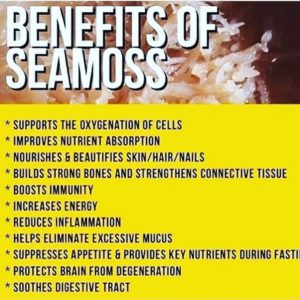
What is sea moss?
Chondrus crispus is a type of edible seaweed that is found in the coastal regions of the Atlantic, including those in Europe and North America. Like other types of seaweed, it’s rich in many nutrients which are difficult to get from normal food sources.
Carrageenan is a natural and vegan-friendly food additive that is commonly used by food manufacturers. It is able to thicken and emulsify foods while maintaining its all-natural properties.This is why it’s more common to find sea moss in supplement form rather than as a recipe ingredient.
Throughout history, sea moss has been variously called Irish Moss, Red Sea Moss and Sea Pearls. Sea Pearls tend to be red in colour but can also come in other colours such as green, brown and even yellow.
Health Benefits Of Sea Moss
- May support thyroid health
Thyroid gland regulates growth, energy, reproduction and repair by releasing hormones. One major nutrient for thyroid is iodine and another is tyrosine.These two nutrients can be found in seaweed, depending on the variety and storage. However, this varies from sea plant to sea plant.
- May support gut health
Seaweed is rich in dietary fiber, much of which come in the form of polysaccharides. These can’t be digested by humans but are easily consumed by gut bacteria, which use them as part of their diet.
The gut bacteria in our bodies is changed when we consume certain foods. Providing the right nutrients in these foods can help promote growth of friendly microbes that can help maintain health. For example, these good bacteria produce butyrate which is important for many functions including regulating inflammation .
- May support immunity
The seaweed in the coastal waters has evolved to be able to withstand harsh conditions and as a result, they have developed a high level of resilience.Phytochemicals, like the ones found in chlorella, provide a range of health benefits. These include immune system modulation and optimisation of the immune response for improved immunity.
- May improve blood sugar control
There are a lot of benefits to eating seaweed, one of them being that it can help to manage blood sugar and reduce the risk of type 2 diabetes.This is thanks partly to the carotenoids & fucoxanthin that help reduce insulin resistance and support better blood sugar control. The high fiber content in seaweed also helps slow down the speed of digestion.
- May support heart health
Seaweed is one of the best places to get your omega-3’s, which are essential for good health. Seaweed in particular contains these nutrients that are especially beneficial for the heart & cardiovascular system.Sea weeds have been found to balance cholesterol & thin the blood in an effect to reduce the risk of heart disease.
It’s worth noting that although some studies examine the effects of sea moss, many use alternative species of seaweed. Therefore, more research is needed to clarify our understanding of the specific health effects of sea moss in the human diet.
Is sea moss safe for everyone?
Seaweed is rich in natural iodine which makes it beneficial for those that primarily eat plants. It is important to be aware that more seaweed than necessary can still have negative effects on the thyroid.The British Dietetic Association recommends that seaweed is not eaten more than once a week, especially during pregnancy.
If you are on blood thinning medications like warfarin, you need to make sure to balance your vitamin K intake by eating certain types of foods. One food that is high in vitamin K is seaweed.If you are taking certain types of medication, it may affect your dietary habits. If one of these pills is affecting your potassium levels, for example, then eating too many foods high in this mineral could cause health problems.
Some seaweed has the ability to store minerals in high amounts, but it can also absorb toxic heavy metals.There are benefits to consuming sea moss in moderation, but it’s best to be cautious, as there’s also the potential risk of toxicity.
